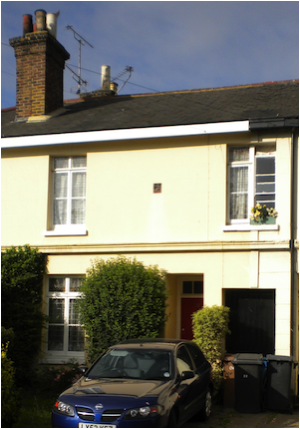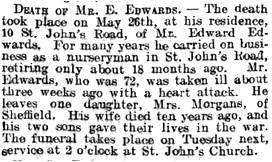Edgar Edward Edwards was born and raised in Chelmsford. He worked for his father’s nursery business and joined the British Red Cross in October 1914. He became engaged and died from typhoid while working in a hospital in Serbia in February 1915. His home was in St. John’s Road. His brother also lost his life in the war.
EDWARDS, EDGAR EDWARD,
Orderly, British Red Cross
The young man well known and respected in the town. was a member of the Chelmsford Voluntary Aid Detachment, and at the outbreak war volunteered for service under the British Red Cross Society. was accepted, and went out to Uskub, Serbia, where has won the regard of all with whom came into contact.
On the 1st inst. Mr. Edwards, sen., received a telegram from Dr. Holmes, who is in charge of the hospital where his son has been working, stating that Edgar was ill with fever. On Sunday last another telegram was received the effect that patient was progressing favourably through severe illness. About an hour later Mr. Edwards had a further telegraphic message, which read, Deepest sympathy also with Brick-Dale," (Miss Brick-Dale the young man's fiancee.) On Wednesday a further telegram stated that the patient was having hard struggle, but had a good chance of recovery. Naturally, in view of these conflicting reports, and the difficulty of tracing the order which the telegrams were dispatched from Serbia, Mr. Edwards exceedingly anxious.”
By then Edgar had died; his death occurring in Serbia on 8th February 1915 from Typhoid.
The Essex Weekly News of 19th February 1915 reported:
“Local man’s death in Serbia. - We regret to announce that Mr. Edgar Edwards, elder son of Mr. Edward Edwards, the Nurseries, St. John’s-road, has died in the British Red Cross Society’s Hospital at Uskub, Serbia. Last week it was stated that the deceased’s parents had been informed of his illness, and were led to believe that death had supervened, but no definite intelligence came to hand until Saturday.
In the morning Mr. Edwards received a letter from the Hon. Arthur Stanley, M.V.O., M.P., chairman of the Executive Committee of the Red Cross Society, stating that his son died from typhus fever on the 8th inst., which was his 22nd birthday. Just after one o’clock in the afternoon a telegram from Uskub confirmed the sad news. In the course of his letter the Hon. Arthur Stanley said ‘On behalf of the Committee and myself, I desire to express to you our deep sympathy at the irreparable loss which you and your family have suffered by the death of your son. He had passed away heroically doing his duty on behalf of his country, and we are profoundly touched by the sad news of his death.’
Mr. Edwards in acknowledging the letter, expressed the thanks of himself and the family to the Society for the prompt information given them throughout deceased’s illness, and added: ‘We are quite confident that everything was done under the circumstances to combat such a very fatal form of fever, for which we feel particularly grateful to Dr. Holmes and the rest of the officials.’”
Edgar is commemorated on the Civic Centre Memorial, Chelmsford which records his rank as ‘Private’, and the Moulsham Parish Memorial, St John’s Church, Moulsham.
Edgar’s mother died in 1917, an event reported by the Essex Weekly News of 22nd June 1917:
“Sudden death of Mrs. Edwards. - The death of Mrs. Edwards, wife of Mr. E. Edwards, nurseryman, of St John’s-rd, occurred very suddenly on Sunday morning. The deceased actively interested herself in her husband’s business and was in her garden on Saturday. She got up to dress on Sunday morning, but complained of a pain at the back of her head. Her daughter went downstairs for a cup of tea, but before any assistance could arrive Mrs, Edwards passed away as the result of a stroke. She leaves one son and a daughter, an elder son having died on service with a Red Cross unit in Serbia. Much sympathy is felt for the widower and his family, Mr. Edwards having not long ago undergone a very serious illness - The funeral took place on Wednesday, the first part of the burial service being said at St. John’s Church and the interment following at the Borough Cemetery.”

Edgar was born on 8th February 1893 in Chelmsford, the elder son of the market gardener and nurseryman Edward Edwards and Phoebe Edwards (nee Quaintance). His father had been born in Knighton, Herefordshire in 1854; his mother at Aylesbeare in Devon, in 1860. Edward and Phoebe had married in 1884 in Somerset.
In 1891 they had been resident at 8 Garfield Terrace, Springfield Road, Springfield.
Edgar’s two siblings (Chelmsford-born) were Phyllis Phoebe Edwards (born on 11th April 1896, died 1969) and Walter Percival Edwards (born in 1901).
On 18th March 1898 Edgar’s father appeared at the Chelmsford Petty Sessions and was fined five shillings with 6 shillings and sixpence costs after being found guilty of refusing to allow his children to be vaccinated. In an earlier hearing he had stated that he was sorry to break the law, but he would rather do so than submit his child to vaccination. Two other men were convicted for the same offence with regard to their children.
The 1901 census showed Edgar aged eight, his parents, widowed paternal grandfather, two elder siblings and servant at 3 St John’s Road (today number 8), Chelmsford.
Edgar’s father was a market gardener; his grandfather, an 84 year-old agricultural labourer.
A decade later the 1911 census found 18 year-old Edgar living with his parents and two siblings at 10 St. John’s Road (today’s number 22. pictured). He assisted his father in the latter’s nursery.
Edgar subsequently became engaged to a Miss Brick-Dale.
With experience as a member of the Chelmsford Voluntary Aid Detachment Edgar enrolled into the British Red Cross on 29th October 1914 when aged 21, to work as an orderly. He was sent to Serbia.
The British Red Cross’s records recall:
“The first unit which was sent out on 29th October 1914, was composed of six doctors and twelve orderlies. Eight hundred severely wounded men were housed in a factory building with inadequate sanitary conditions. Towards the end of January 1915 typhus broke out in the medical wards and spread with great rapidity. To increase the difficulties of the situation small-pox, diphtheria and scarlet fever appeared, so that the hospital became rife with infectious disease. The staff did not escape, three doctors and seven orderlies contracted typhus, with two orderlies dying. The second unit left for Serbia in January 1915 and consisted of five surgeons, one matron, six trained nurses, seven VAD members and nine orderlies. This unit served at Vrnjatchka Banja until February 1916. The Typhus epidemic had subsided by May. In addition to the military, the unit treated the civilian sick due to the outbreak of small-pox and there were also separate wards for diphtheria, scarlet fever and tuberculosis.”
On 13th February 1915 the Newman Herald reported:
“CHELMSFORD MAN IN SERBIA PARENTS' ANXIETY. Much sympathy is felt for Mr. Edward Edwards, the Nurseries, St. John's Road, Chelmsford, in regard to his elder son, Edgar, aged 22, who in Serbia under the auspices of the British Red Cross Society.

Edgar’s brother Walter Percival Edwards died on 9th October 1918 while serving in the Royal Air Force.
The 1918 register of electors listed their father at 10 St John’s Road, Chelmsford (later renumbered as 22). Edgar’s father died in 1927, aged 72.
131008